Academic
Programs
Cambridge Curriculum (Play Group to “A”- Level)
Junior Section (Play Group – KG 2)
We believe the kindergarten environment should provide opportunities for experimentation, exploration, discovery, challenge, and interaction. An atmosphere of understanding, concern, and compassion should surround the kindergarten child in this most important school experience. We also believe that kindergarten should provide a safe supportive environment that promotes positive self-esteem; and helps children acquire and maintain the skills and attitudes necessary for personal success. A primary goal of the kindergarten year is to develop independent, confident learners who discover the excitement and challenge of learning in their school experience and throughout their lives.
WA facilitates the opportunities for junior students to learn and develop in the way that best suits them according to their age and stage of development. We encourage kids to take a look at their surroundings, assume independently, ask questions and freely express themselves without fear or inhibition. These activities mainly cover the following areas: languages, rhymes, phonics, mathematics, science, creative development, personal and social development, confidence, motivation and concentration, awareness and perceptions of the environment and physical development. We maintain an Islamic environment which helps kid to learn Islamic norms and values for instance, the students learn and apply Masnun du’aas in their daily life activities.
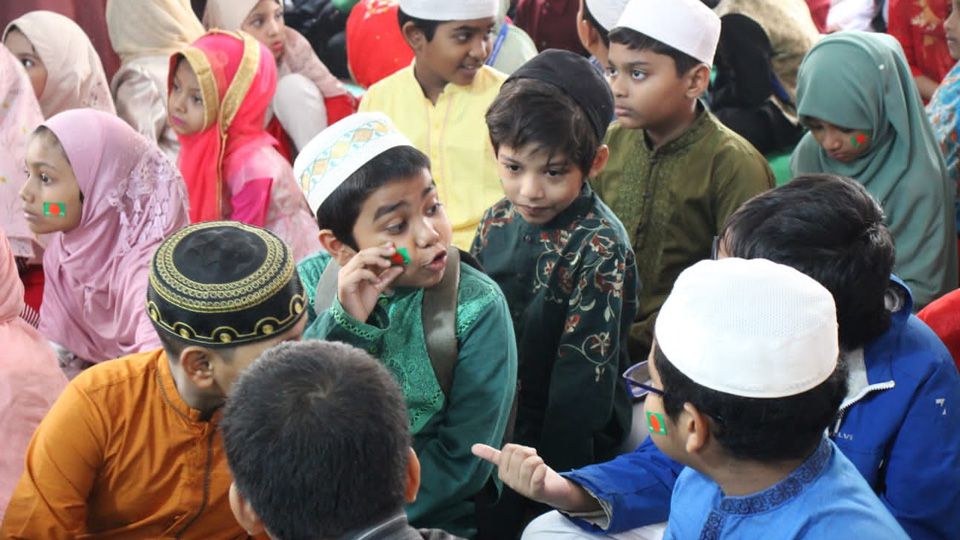
Mid Section (Grade 1 – Grade 7)
We provide our young learners an exposure to wide range of subject areas to keep them motivated to become creative, analytical and continue to achieve academic success. High-quality teaching strategies and methods hinge on fostering children‘s development and learning in all domains—physical, social-emotional, cognitive, and language.
Our Middle school students learn in an interactive and integrated learning environment with a focus on the interrelationships of the core curriculum, Islamic values, and education with a local, regional and global perspective. Students learn from the classroom, experience practical learning through experiments, environment, and different activities.
In co-existence with the English medium curriculum, we are offering “Islamic Environment” and “Deeniyat Course” for teaching Holy Quran with Tajweed and Deen. There are 4 subjects in this course such as 1. Quran, 2. Hadith and Masael, 3. Aqeeda, 4. Islamic Etiquette. The basics of Islam (Aqeedah, Akhlaq, Sirat, Fiqah, etc.) are taught through the Deeniyat series which is published in other countries as well, including Britain and South Africa. Arabic language is taught from Grade-4, by which one can directly understand the meaning of Quran and Hadith. In addition, Fiqh, Aqeedah and other necessary components of religion, are taught through real life practice.
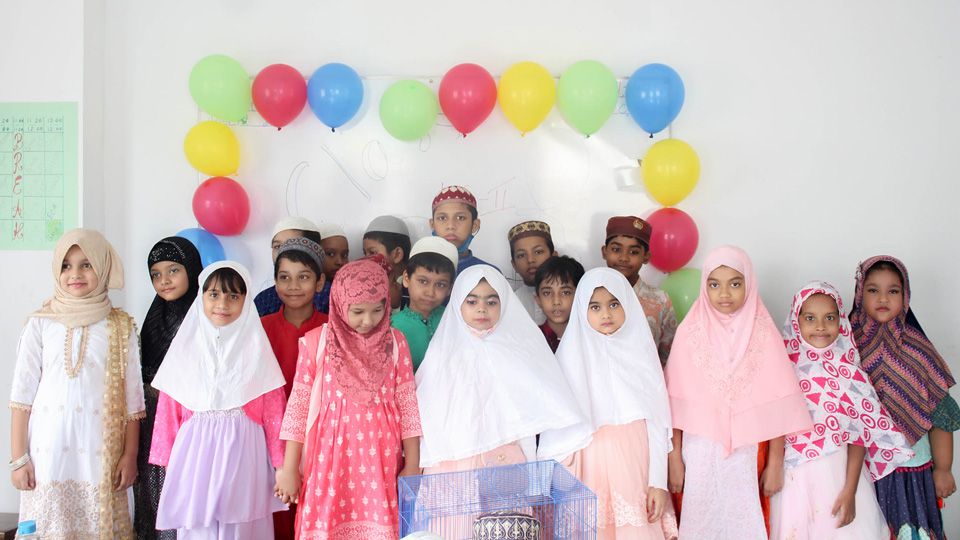
Senior Section (Grade 8 – Grade XII)
Our Senior School’s students are always encouraged to engage, lead, invent, explore, manage, organize, present and compete – equipping them for eventual success in the public examinations under Cambridge International Examinations. The curriculum therefore focuses on student-centered learning using appropriate teaching and learning strategies such as group and cooperative learning. Problem solving strategies, higher level thinking and analytical skills are consistently emphasized during the student’s learning experience.
In order to provide all children in our care with full access to the Cambridge Curriculum and the Islamic Curriculum we ensure that: -
- Children’s educational needs, whether through learning difficulties or exceptional ability, are identified, assessed and provided for
- Parents are fully involved, at all stages, regarding provision for their child’s academic and emotional needs.
- Use is made of all agencies which may be able to assist in the identification and assessment of a child’s special academic needs.
The emotional support that teachers give to students, provides a solid foundation for developing the motivation and cognitive skills critical to positive long term academic outcomes. Indicators of social adjustment in school settings include self-control, emotional regulation, getting along with peers and enjoyment of school.
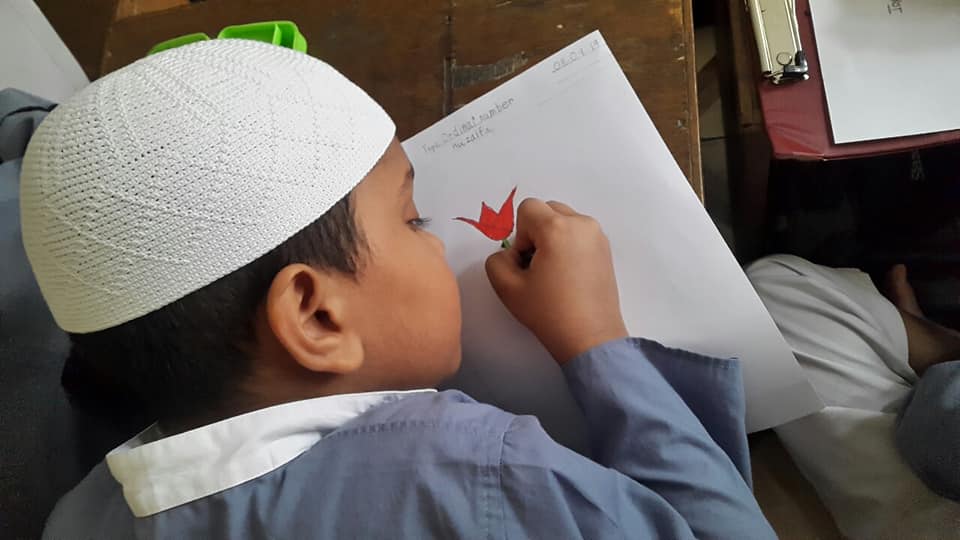
The Department of Hifzul Quran
Wisdom Academy's Arabic Curriculum includes Pre-Hifz or Nazrana till Class-3. The Department of Hifzul Quran is primarily for the students interested in Hifz. Timing for non-resident students is from morning 08:00 am to night 08:00 pm. Along with Hifz, English, Mathematics, Bengali and Science are taught in class 4 for an hour daily (weekly five days).
Furthermore, our institution also provides an excellent facility of learning Holy Quran for ordinary school going students and adults; along with the provision of learning both Holy Quran and teachings of Islam for elderly women following the norms of Shariyah.
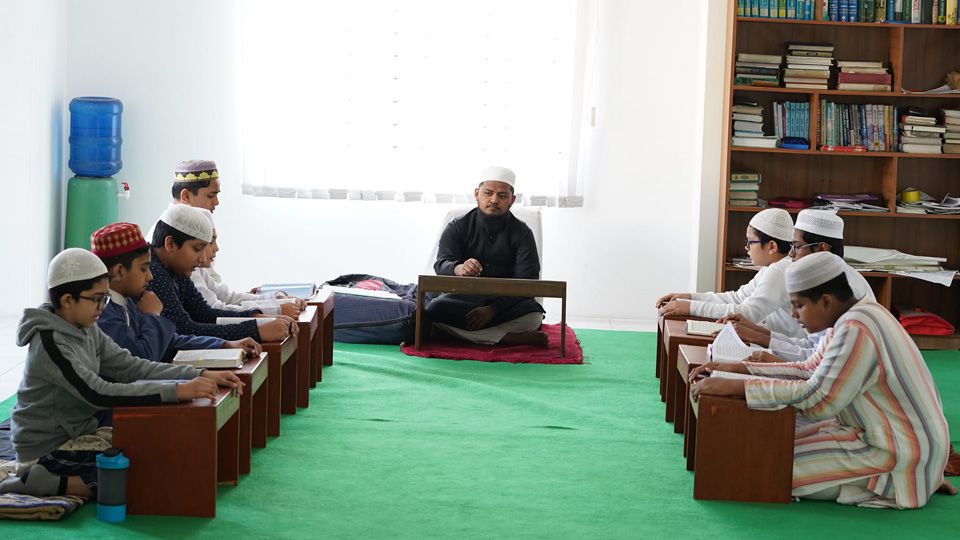
Nurani Maktab
“Deeniyat Course” for teaching Holy Quran with Tajweed and Deen. There are 4 subjects in this course such as 1. Quran, 2. Hadith and Masael, 3. Aqeeda, 4. Islamic Etiquette. The basics of Islam (Aqeedah, Akhlaq, Sirat, Fiqah, etc.) are taught through the Deeniyat series which is published in other countries as well, including Britain and South Africa.
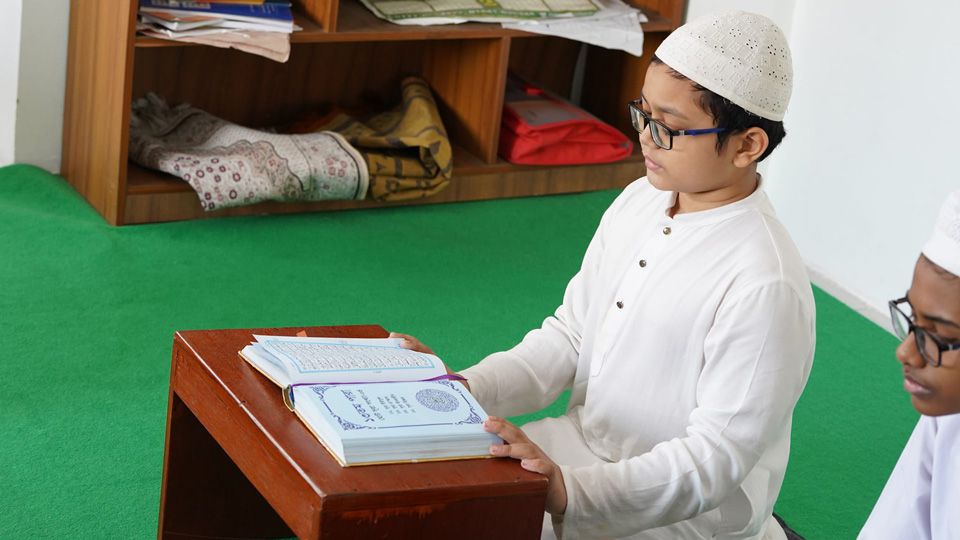
Teaching Method
- Children and young learners are engaged in different activities (such as, role plays, games, free plays, puzzles, building blocks, clay, etc.) aimed at creating a friendly environment where students can learn and develop important skills without feeling any pressure.
- Young students are encouraged to develop their communication skills by making them communicate through various innovative means, such as arts, writing, crafts, etc.
- Children are guided to grow their imaginations by games, stories, making objects from simple materials, etc. For kids, more focus is given on oral and creative activities rather than reading and writing.
- Different sensory learning activities, such as touching, smelling, seeing, tasting, and hearing are undertaken to help younger students in developing their personality traits.
- Students are motivated and encouraged to become enthusiastic and curious about seeking knowledge and developing important life skills. Also, students are helped to become self-learners.
- Student’s ideas and opinions are valued and their needs are identified and effectively addressed.
- Most up to date knowledge-content of all substantive areas are incorporated in all class-syllabi.
- To strengthen the learning, a variety of teaching methods are used such as CLT (communicative Language Teaching) approach, experiential learning, role plays, simulations, research projects, term-papers, case-studies, problem-solving exercises, field-trips, inviting guest-lecturers, etc.
- To evaluate students’ performance through regular formative assessments such as periodical tests, monthly examinations; and two summative (annual) assessments such as Mid Term and Final Term.
- To update our youngsters through completion of a variety of project works, topic wise presentations, and also to develop their creative and analytical thoughts through short speeches, lectures and debate competitions.
Learning Outcomes
- Wisdom graduates will be able to demonstrate effective written and oral communication skills.
- Wisdom graduates will be able to exhibit creative problem solving skills in both higher learning and workplace environments.
- Wisdom graduates will be able to demonstrate the critical thinking capability in their future endeavors.
- Wisdom graduates will be able to work in teams and groups effectively and efficiently.
- Wisdom graduates will be able to uphold high ethical and moral standards (such as truthfulness, honesty, Ahklaq, integrity, sincerity, mannerism, patience, thankfulness, ikhlas ect.) under all circumstances.
- Wisdom graduates will be sensitive to all genuine social and environmental causes.
- Wisdom graduates will be firm believers in the Holy Quran and the Sunnah of prophet Mohammed (PBUH).
- Wisdom graduates will be able to practice the Sunnah of Prophet Mohammad (PBUH) in all areas of their lives.
- Wisdom graduates will be well versed in Shariah and able to read the Holy Quran and Ahadith in Arabic.
- Wisdom graduates will be able to exhibit professional skills needed when exercising judgments in professional careers.
- Wisdom graduates will be imbued with truth, honesty, character and integrity, so they may achieve success in this world as well as in the life hereafter.